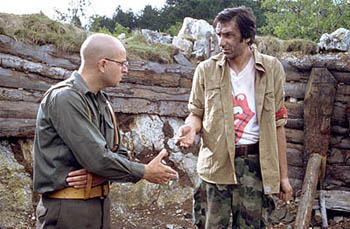![[Metroactive Movies]](/movies/gifs/movies468.gif)
[ Movies Index | Show Times | Silicon Valley | Metroactive Home | Archives ]
 Lost in the Trenches: Rene Bitorajac (left) and Branko Djuric form an unlikely alliance in 'No Man's Land.' Trench Revelation 'No Man's Land' is about war--and more By Dejan Vekic THE SOON-TO-BE-celebrated Black Hawk Down drops you into the fighting and keeps you there. It doesn't have the normal things that build a movie, like romance and characterization and plot; it's just a visceral experience of the violence at Mogadishu, Somalia, in 1993. When it comes time to explain why it all went wrong, though, director Ridley Scott goes shy. Mark Bowden's nonfiction book Black Hawk Down investigates why these civilians were so angry. In the film version, we aren't informed about those killed accidentally on previous raids by the U.S. soldiers, or see how the prop-wash from the patrolling U.S. Army helicopters blew the tin roofs off the Mogadishu homes. In Scott's movie, they're all just bad guys, ethnic villains puffing their huge corrupt cigars. Foreign villains are always smokers: the Bosnians in Behind Enemy Lines all smoke like they own Phillip Morris stock. Black hearts, black lungs. Contrast these African murderers with Bowden's quote from the proverbial unnamed U.S. State Department official on Somalia: "Here you have a country where just about everybody is caught up in hatred and fighting. You stop an old lady on the street and ask her if she wants peace, and she'll say, yes, of course, I pray for it daily. ... Then ask her if she would be willing for her clan to share power with another in order to have that peace, and she'll say, 'With those murderers and thieves? I'd die first.' People in these countries--Bosnia is a more recent example--don't want peace. They want victory. ... The killing continues because they want it to. Or because they don't want peace enough to stop it." Consideration of ancient anger that goes beyond good guys and bad guys makes No Man's Land, not Black Hawk Down, the best war movie of the year. Director Denis Tanovic's film brings the action down to the level of one trench between the lines in June 1993, a lovely hot spring day in the mountains. The wildflowers are in bloom. Two soldiers meet. One is a Bosnian survivor of a wiped-out squad, Chiki (Branko Djuric). The other is a baby-faced, peach-fuzzy Serbian Nino (Rene Bitorajac), sent on a dangerous assignment because everybody hates him--Nino's plump and wears glasses; he's green as grass. Nino and a partner investigate an abandoned Bosnian trench filled, they think, with enemy bodies. Chiki is hiding in it, alive. The Bosnian kills Nino's partner, leaving Nino alive and wounded. But there's one other problem. Right before the skirmish, Nino's now-dead partner merrily booby trapped a corpse with a land mine, so that troops collecting the soldier's body will get it in the stomach. As the sunshine gets hotter, the Bosnian corpse wakes up--he was only knocked out. He, Cera (Filip Sovagovic), can't move for fear of setting off an explosion. Since Chiki the Bosnian and Nino the Serb are pinned down by the guns of both sides, they try to overcome their mutual hatred to save their necks, but Tanovic is too bitterly experienced with the Balkan situation to make No Man's Land an ordinary brotherhood-of-man tale. Yet Tanovic doesn't just want to twist the guts of the viewers; he takes the story out of the trench to show us the rest of the war: the good intentions of the intervening forces. The United Nations, when it arrives, is brave, eager and ineffectual: "It's the Smurfs!" shouts a soldier, seeing their baby-blue helmets. The U.N.'s leadership is satirized, as in Dr. Strangelove; their CO, a British Army officer, is named "General Soft" and is played by Simon Callow, an actor specializing in pampered jammy men. Like George C. Scott's "Buck" Turgidson, the general has a long-legged secretary to keep people from bothering him. All this may be too cranky for the otherwise serious tone of No Man's Land. While it's good to see Katrin Cartlidge as a reporter from "Global News Network" (CNN obviously), she's treated as a kind of sharp vulture. A man poised on a mine was used as a dumb gag in Behind Enemy Lines, but Tanovic's horror story is more like one of Ambrose Bierce's tales of the Civil War. As in Bierce, the situation in No Man's Land is so fatally idiotic, so impersonally malign, that the question of rightness and wrong, of who hit whom first, vanishes. No Man's Land is thrilling, in the way classics like The Wages of Fear are thrilling. But unlike Black Hawk Down, you leave flabbergasted, because you've learned something more that what Ridley Scott likes to teach, about how all flesh is grass, and only honor persists. The concept that war is inevitable is more cynicism than even this particular cynic endorses. In its haunting closing shot, No Man's Land urges us not abandon our hopes for peace, no matter how unlikely they seem.
No Man's Land (R; 97 min.), directed and written by Danis Tanovic, photographed by Walther Vanden Ende and starring Branko Djuric and Rene Bitorajac, opens Friday at Camera 3 in San Jose. [ Silicon Valley | Metroactive Central | Archives ]
|
From the December 27, 2001-January 2, 2002 issue of Metro, Silicon Valley's Weekly Newspaper.
Copyright © 2001 Metro Publishing Inc. Metroactive is affiliated with the Boulevards Network.
For more information about the San Jose/Silicon Valley area, visit sanjose.com.